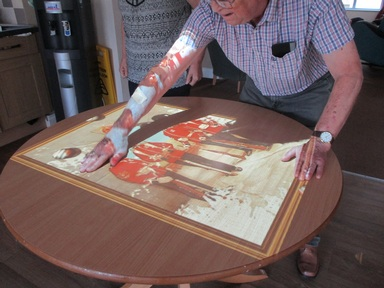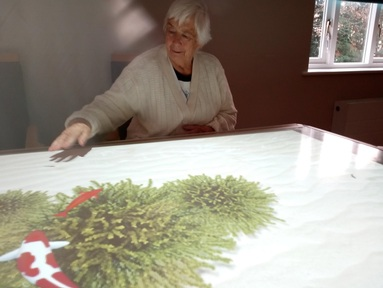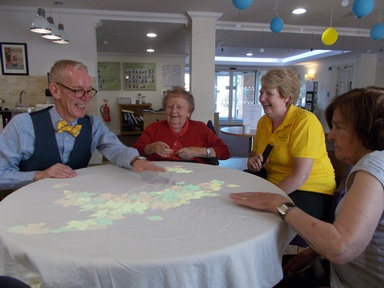Magic tables 'engage residents with dementia' in roll-out across care home group
Date Published: 02 Aug 2019 @ 16:41 PM Article By: Michaela Chirgwin
Increasingly, magic tables are being used in care homes to cognitively stimulate and engage care home residents with or without dementia, but one care group is installing tables in homes that have a large dementia community and are adding them to new builds.

Barchester Beeston home
Barchester Healthcare have so far rolled out 50 magic tables to homes that have a significant number of residents with dementia. They have ambitious plans to add to this number over the coming years.
According to Caroline Baker, the director of dementia care at Barchester, “Our primary focus at the moment is to roll the scheme out for our people with dementia as it has proved to be hugely beneficial for them.”
Table kept switched-on in the day ‘so people can just go in and engage’
Meaningful experiences are essential for people with dementia. Apathy in residents with dementia can lead to a rapid decline in the health of the individual. In a research study by the University of Exeter, it was stated: ‘Where people withdraw from activities, it can accelerate cognitive decline and we know that there are higher mortality rates in people with apathy.”
Holyfield Care Home in Kidderminster was the first Barchester residential home to have a magic table. Michael Butler is the activities coordinator there, and he found some of the residents with late stage dementia were becoming increasingly difficult to engage with.
He says: “We had residents that were quite far into their journey with dementia – they needed mentally stimulating - other things that we had tried weren’t working.”
They initially trialed the table for residents after working with Barchester’s dementia care team and have had the table for nearly two years. Mr Butler says: “We tend to leave ours on during the day so people can just go in and engage”

Barchester Hollyfields home
Mr Butler believes the tables have drastically cut instances of agitation and apathy within the home and has really connected the residents.
He says: “The impact that this equipment has had in a short space of time has been incredible. Residents who didn't tend to join in conversations or were prone to becoming agitated have become engaged, and many have shown absolute delight when playing these games. It has been a real joy to see the increased interaction from residents within our home with the table and with each other.”
‘Some residents use it with their feet’
The main premise of the equipment is that it’s a projector beaming easily identifiable images down onto a table, floor or indeed any kind of surface. The images are highly interactive and this increases mental stimulation and interaction for residents.
Mr Butler says: “For some of our residents we actually use it on the floor so that they can use their feet. There are beams that come down and basically when you break the beam, you are interacting with the table."
One of the most popular games, according to Mr Butler is called ‘fish’. It projects a fishpond onto the floor, or a table and it has reeds, weeds and the fish are swimming around. He says: “If you put your hand under the fish, it actually swims on your hand.”
The activity coordinator believes the magic table is really good for male residents in the home who seem to really like one particular game with a beach ball which can change into a football. He says the magic table is a big hit with all the residents, but Mr Butler admits: “It’s probably safe to say that more male residents use it than the females.”
Individuals are risk assessed to see if they can stand and play games with their feet, such as the beach ball game, however, staff might deem that it’s safer for some residents to sit and play the game in their chairs.
Owner of magic table company spent 10 years looking after dad with dementia
Jon Ramsay is the chief executive of Shift8 Tovertafel (Magic Table). He was a corporate lawyer in London and knew he wanted to get involved in a business project that involved helping people with dementia. The condition has had a big impact on his life.
He says: “Sadly my dad was diagnosed with dementia when I was just 12 and I spent the next ten years caring for him.” The magic table project was perfect for him at a particular point in time. He says: “I was looking for something that gave me more meaning.”
Tovertafel means magic table in Dutch and was created as part of a 6-year Ph.D. research project in Holland. A friend of Mr Ramsay’s called Hester Le Riche spent about six years looking into how to make people living with dementia happier.

Barchester Sutton home
Mr Ramsey says: “She [Ms Le Riche] decided to look at it quite scientifically and structured it around three key elements. One element was how to get people moving and physically engaged; another was the social engagement and the final element was how to help people become cognitively engaged.”
It was discovered ‘almost by accident’ how levels of engagement created by lights on the table could be significantly increased for those with dementia.
Mr Ramsey explains: “Hester discovered that just the very nature of having lights on the table in front of you was very, very engaging, so if you could make them as engaging as possible for someone living with dementia, then you would have a really cool activity that could be used with loved ones, staff, family, friends and the wider community.”
Tables to be rolled out to 150 homes and automatically added to new builds
Barchester were one of the earliest adopters of magic table activities within a care home environment. They are working with the makers of Tovertafel to roll out as many tables as possible in the coming years.
The cost of a Tovertafel is between five and six thousand pounds; this includes eight original games, free installation, training and a three-year service. Ms Baker believes the tables are “well worth the money” but because it is considerable outlay for multiple purchases within a care home budget, they are phasing their approach to installation of the equipment across the group.
Ms Baker says: “We’ve currently rolled out fifty of the magic tables across the company and there is a plan to put another 50 in next year, and then another 50 after that. In all of our new builds, they go in straight away.”
The eventual plan is that the project will be fully rolled out across all the homes as the magic tables also have huge benefits for residents without dementia too – especially when it comes to socialising and interacting with staff, family and other residents.
Dr Pete Calveley, chief executive of Barchester Healthcare said: “We are delighted by the overwhelming response of our Barchester residents when using the Tovertafel. Designed to create moments of happiness for the residents, it is heart-warming to provide positive and invaluable experiences, with residents more motivated to interact with staff, family and carers alike.”
STEM rewards have been removed from this content.